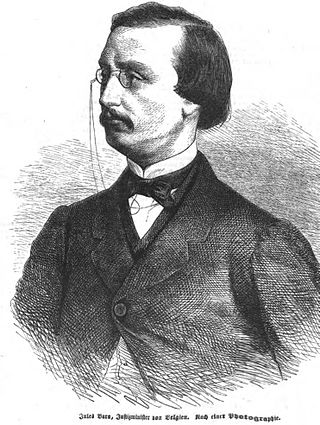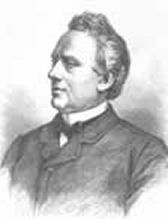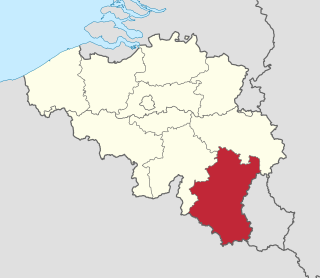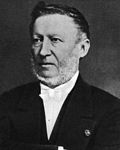
Transport in Belgium is facilitated with well-developed road, air, rail and water networks. The rail network has 2,950 km (1,830 mi) of electrified tracks. There are 118,414 km (73,579 mi) of roads, among which there are 1,747 km (1,086 mi) of motorways, 13,892 km (8,632 mi) of main roads and 102,775 km (63,861 mi) of other paved roads. There is also a well-developed urban rail network in Brussels, Antwerp, Ghent and Charleroi. The ports of Antwerp and Bruges-Zeebrugge are two of the biggest seaports in Europe. Brussels Airport is Belgium's biggest airport.

Jules Edouard Xavier Malou was a Belgian statesman, a leader of the Catholic Party.

Jules Bara was a Belgian statesman and liberal politician.

Brussels-North railway station is one of the three major railway stations in Brussels, Belgium; the other two are Brussels-Central and Brussels-South. Every regular domestic and international train passing there has a planned stop. The station has 200,000 passengers per week, mainly commuters, making it one of the busiest in Belgium.

Full general elections were held in Belgium on 27 May 1900. They were the first elections under a proportional system instead of a majority system, with Belgium becoming the first country in the world to adopt proportional representation for parliamentary elections. Single-member constituencies were replaced with multi-member constituencies of between three and eighteen seats.
Partial general elections were held in Belgium on 22 May 1910. The result was a victory for the Catholic Party, which won 49 of the 87 seats up for election in the Chamber of Representatives.
Full general elections were held in Belgium on 2 June, 1912.

Partial general elections were held in Belgium on 24 May 1914. The result was a victory for the Catholic Party, which won 41 of the 88 seats up for election in the Chamber of Representatives.
General elections were held in Belgium on 29 August 1831. They were the first elections to the new bicameral parliament created by the constitution adopted in February 1831.

General elections were held in Belgium on 11 August 1864, the first full general elections since 1857. The snap elections were called upon the loss of a parliamentary majority for the liberal government of Charles Rogier and a hung parliament, following the death of liberal representative Charles Cumont on 10 July 1864. In the last few parliamentary sessions preceding the elections, all Catholic members quit the Chamber, resulting in it not being quorate. The Chamber was disbanded by order of 16 July.

Partial general elections were held in Belgium on Tuesday 11 June 1872. In the elections for the Chamber of Representatives the result was a victory for the Catholic Party, which won 71 of the 124 seats. Voter turnout was 55.5%, although only 54,933 people were eligible to vote.

Partial general elections were held in Belgium on 13 June 1876. In the elections for the Chamber of Representatives the result was a victory for the Catholic Party, which won 67 of the 124 seats. Voter turnout was 67.5%, although only 63,278 people were eligible to vote.

Partial general elections were held in Belgium on 14 June 1859. The result was a victory for the Liberal Party, which won 69 of the 116 seats in the Chamber of Representatives and 31 of the 58 seats in the Senate. Voter turnout was 55.9%, although only 49,672 people were eligible to vote.

Partial general elections were held in Belgium on 13 June 1882. The result was a victory for the Liberal Party, which won 79 of the 138 seats in the Chamber of Representatives and 37 of the 69 seats in the Senate. Voter turnout was 75.1%, although only 55,517 people were eligible to vote.
Bel RTL is a commercial radio network broadcasting in Brussels and Wallonia. The station is owned by the Radio H holding company, which is part of the Belgium-based RTL Belgium. It is now owned by DPG Media and Groupe Rossel since 31 March 2022.
The following lists events that happened during 1884 in the Kingdom of Belgium.

Luxembourg is one of the 11 multi-member constituencies of the Chamber of Representatives, the lower house of the Belgian Federal Parliament, the national legislature of Belgium. The constituency was established as Arlon-Marche-Bastogne-Neufchâteau-Virton in 1995 following the fourth Belgian state reform. It was renamed Luxembourg in 2003 following the re-organisation of constituencies across Belgium along provincial lines. It is conterminous with the province of Luxembourg. The constituency currently elects four of the 150 members of the Chamber of Representatives using the open party-list proportional representation electoral system. At the 2019 federal election the constituency had 212,441 registered electors.
Constituencies are used for elections in Belgium.















